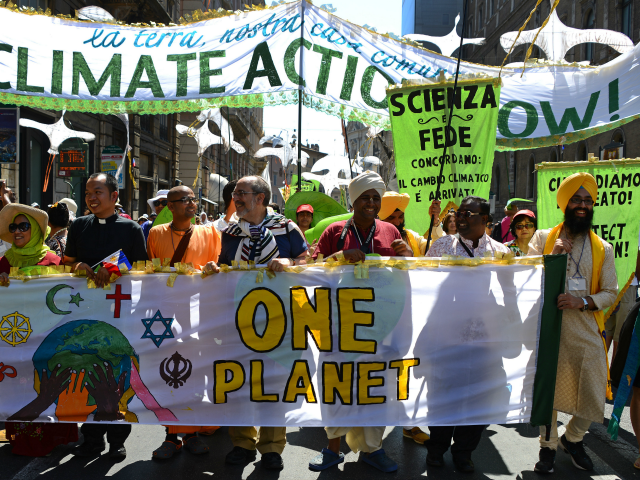Pope Francis painted a frightening picture of a global climate emergency Monday, saying we humans must “correct our path before it is too late.”
“Around the world, we are seeing heat waves, droughts, forest fires, floods and other extreme meteorological events, rising sea levels, the emergence of diseases and further problems that are only a dire premonition of things much worse to come, unless we act and act urgently,” the pope told a group of leaders assembled at the Vatican for a meeting titled “Climate Change and New Evidence from Science, Engineering, and Policy.”
“Time is of the essence,” the pope told the group, which included the president of the General Assembly of the United Nations and the finance ministers of various nations. “You are here today to reflect on how to remedy this profound crisis caused by a confusion of our moral ledger with our financial ledger. You are here to help stop a crisis that is leading the world towards disaster.”
The pontiff said that the concentration of carbon dioxide in the atmosphere is at “the highest level ever recorded,” a phenomenon that must be reversed before it is too late.
“The effects of global inaction are startling,” he said. “About two weeks ago, several scientific research centres recorded the concentration of carbon dioxide in the atmosphere – one of the key global causes of global warming linked to human activity – as having reached 415 parts per million, the highest level ever recorded.”
“The signs today are not good,” he said. “Investments in fossil fuels continue to rise, even though scientists tell us that fossil fuels should remain underground.”
Moreover, “investments in clean energy fell again for the second consecutive year, even though experts have consistently demonstrated the benefits to the human environment provided by clean energy from wind, sun, and water,” he said.
The cause of this deadly inaction on climate change, he said, are bad reasoning as well as pressure from powerful interest groups.
“We continue along old paths because we are trapped by our faulty accounting and by the corruption of vested interests,” he said. “We still reckon as profit what threatens our very survival.”
Francis said that humanity must “act decisively to put an end to all emissions of greenhouse gases by mid-century at the very latest, and to do even more than that. Carbon dioxide concentrations have to decline significantly to ensure the safety of our common home.”
The pontiff went on to propose a series of objectives to the group, including putting “an end to global dependency on fossil fuels” and opening “a new chapter of clean and safe energy, that utilizes, for example, renewable resources such as wind, sun and water.”
The pope also underscored “two important agreements,” namely the United Nations’ Sustainable Development Goals and the Paris Climate Agreement COP21. He urged the finance ministers to embrace “the responsibility of working to achieve the goals that your governments have adopted, for the sake of humanity today and in the future. This is a basic commitment.”
“We must achieve what we have agreed upon, for our survival and wellbeing depend on it,” the pope said.
The U.N. program endorsed by the pope goes well beyond addressing climate change, however, and encompasses “17 Sustainable Development Goals and 169 targets,” some of which directly contradict the Catholic Church’s core beliefs regarding human life.
“We are committed to ensuring universal access to sexual and reproductive health-care services, including for family planning, information and education,” the program declares, which includes the putative right to abortion.
The United Nations has been one of the most implacable forces behind a worldwide push for legalized abortion, under its umbrella goals of “reproductive health” and “gender equality.”
In the years leading up to Ireland’s 2018 abortion referendum, for example, the UN repeatedly attacked Ireland for its pro-life laws, employing its international muscle to demand that the predominantly Catholic nation repeal the Eighth Amendment to its constitution that protected the right to life of unborn infants.
One ruling from U.N. human rights “experts,” for instance, said that Ireland’s abortion ban “subjects women to discriminatory, cruel and degrading treatment.”
In 2017, the U.N. Convention on the Elimination of All Forms of Discrimination Against Women (CEDAW) committee attempted to pressure Ireland into changing its abortion laws, declaring that the Eighth Amendment violated women’s rights because it “unduly restricts access to abortion.”
The U.N. committee insisted that Irish law be changed to allow “the introduction of amendments to current legislation governing access to abortion.”

COMMENTS
Please let us know if you're having issues with commenting.